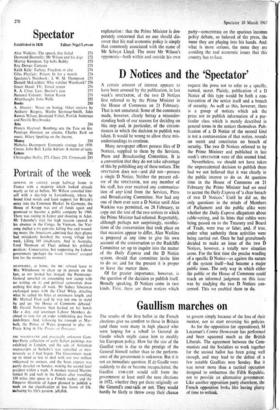D Notices and the 'Spectator' A certain amount of interest
appears to have been aroused by the publication, in last week's SPECTATOR, of the two D Notices first referred to by the Prime Minister in the House of Commons on 21 February. That is not unnatural. Some of the comments made, however, clearly betray a misunder- standing both of our reasons for deciding on this step and, in particular, of the circum- stances in which the decision to publish was taken. It would be wrong to allow these mis- understandings to continue.
Many newspaper offices possess files of D Notices, supplied to them by the Services, Press and Broadcasting Committee, It is a convention that they do not take advantage of this by publishing any of these notices. The SPECTATOR does not—and did not—possess a single D Notice. Neither the present edi- tor of the SPECTATOR, nor any member of his staff, has ever received any communica- tion of anr•kind from the Services, Press and Broadcasting Committee. Nor had any one of them ever seen a D Notice until Alan Watkins was permitted, on 28 February, to copy out the text of the two notices to which the Prime Minister had referred. Regrettably, although perhaps not surprisingly, recollec- tions of the conversation that took place on that occasion appear to differ, Alan Watkins is prepared at any time to give his own account of the conversation to the Radcliffe Committee set up to inquire into the matter of the Daily Express and the D Notice system, should that committee invite him to do so; and for the present it is proper to leave the matter there.
Of far greater importance, however, is the question of the decision to publish itself. Broadly speaking, D Notices come in two kinds. First, there are those notices which request the press not to refer to a specific, named, secret. Plainly, publication of a D Notice of this type would be both a con- travention of the notice itself and a breach of security. As well as this, however, there is a group of notices which ask the press not to publish information of a par- ticular class which is merely described in general terms in the notices themselves. Pub- lication of a D Notice of the second kind is not a contravention of that notice, reveals no secret and constitutes no breach of security. The two D Notices referred to by the Prime Minister and published in last week's SPECTATOR were of this second kind.
Nevertheless, we should not have taken the unprecedented decision to publish them had we not believed that it was clearly in the public interest to do so. At question time in the House of Commons on 21 February the Prime Minister bad no need to accuse the Daily Express of 'a clear breach of two D Notices.' Until he did so, the only questions in the minds of Members of Parliament and the public alike were whether the Daily Express allegations about cable-vetting, and its hints that cables were being passed on to the Treasury and Board of Trade, were true or false; and, if true, under what authority these activities were being carried out. Once he had gratuitously decided to make an issue of the two D Notices, however, a totally new situation arose. For the first time the precise wording of a specific D Notice—as against the nature • of the system itself—had become a major public issue. The only way in which either the public or the House of Commons could reach an informed judgment on this issue was by studying the two D Notices con- cerned. This we enabled them to do.






























 Previous page
Previous page